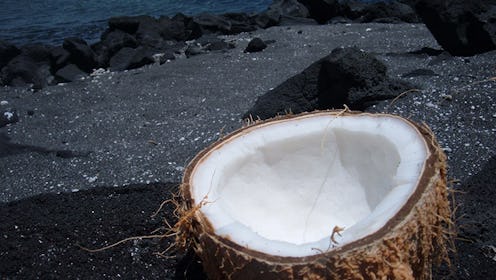Fashion
Can Coconut Oil Really Treat Lice?

We've definitely been on a coconut oil high lately, being that we're using the hydrating oil for practically everything (including teeth whitening!) these days. And while it’s true that the wondrous oil can provide limp and lifeless locks with intense hydration, can coconut oil treat lice just as effectively?
In a nutshell, having lice is no fun. Even the mere thought of the word alone takes us back to grade school, when some poor soul got a bad case every so often. And although children are usually plagued with this pesky problem, there is an estimated amount of six to 12 million cases of lice reported each year, according to the Centers For Disease Control And Prevention. Yikes!
With these alarming statistics, there’s no wonder why people are seeking natural alternatives to cure this icky problem. Just search the web for example, and you’ll be sure to find a plethora of DIY cures, including hair treatments made from apple cider vinegar, tea tree oil, and more. However, can all mighty coconut oil pass the lice treatment test?
Despite it’s antibacterial and antiviral properties, coconut oil may not be the most effective solution to warding away lice infestations.
“All types of oils have been used for centuries for lice treatment, and coconut oil is just one of them. Another popular oil is olive oil,” says Jill Taft, founder of lice-fighting Logic Products. “Coconut oil will not kill lice, but it will temporarily immobilize and suffocate them.” OK, so that's a pretty good start in a pinch.
While it’s best to seek over-the-counter remedies to treat lice, coconut oil can be a temporary solution. If you use enough of the stuff, its oily consistency can leave hair greasy, which makes for an environment lice usually can’t stand.
Try: Nutiva Organic Virgin Coconut Oil, 15 Ounce, $11, Amazon
“Coconut oil is often difficult to wash out and will leave the hair greasy for several days, which is actually helpful. Lice do not like an oily living environment and will find it hostile,” says Taft. “Even though it may not look very appealing, coconut oil will make it more difficult for lice to cling to the hair.”
Greasy hair may work to immobilize lice, but it will not halt the vicious cycle of nits (tiny lice eggs) that will continue to hatch if not treated properly. Coconut oil usually has little to no effect on stopping this yucky process.
“Coconut oil will aid in helping comb out the immobilized lice, but it will have no effect on the nits, which are the tiny lice eggs, that will go on to hatch, and will need to be removed as well to avoid further infestation,” says Taft.
To conclude, coconut oil surely can help you pamper your skin and dried out locks, but it’s not the best cure to treating lice infestations alone.
“Coconut oil is helpful, but not a complete solution, as it is a more labor intensive way to get rid of a lice infestation,” concludes Taft.
Our final verdict? Instead of relying on DIY treatments that may or may not work, be sure to head to your doctor and try any over-the counter-remedies he or she recommends. If not treated correctly, your lice woes can only get worse. Now please excuse us while we try not to itch ourselves in the meantime.